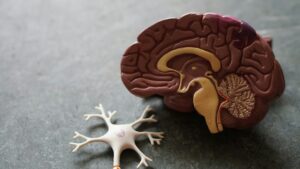The human brain is extremely complex, but to better understand it, we can divide it into two main systems. Together, these systems determine how our brains work and how we behave in everyday situations.
The primal part of the brain: the monkey mind
The first system, which evolved over hundreds of millions of years, includes the reptilian brain and the limbic brain. This primordial brain regulates both basic functions and complex emotions. Think motor skills, the immune system and breathing, as well as memory, emotions, fear and aggression.
Because of its impulsive and instinctive nature, this part of our brain is often called the 'monkey mind' called. It reacts automatically and unconsciously, without the intervention of our rational thoughts. This is useful for quick reactions, but it is not the most reliable part of our brain when it comes to conscious thought.
The neocortex: our professor in action
The second system, the neocortex, sets us apart from animals. This newer part of the brain allows us to learn languages, develop strategies and perform complex tasks, such as preparing a presentation or participating in a long meeting.
The neocortex, or simply 'our professor', is rational and analytical. This part of our brain requires more energy and focus to activate. It is responsible for intelligence, reflection and willpower.
Collaboration between the monkey mind and the professor
In a healthy situation, these two systems work in harmony. The professor helps calm the monkey mind and makes rational decisions, while the monkey mind filters routine tasks and stimuli.
But when this balance gets upset, problems arise. A common example is when people sit behind a screen for long periods of time. The professor then remains hyperactive, while the monkey mind becomes bored and deactivated. This can lead to less concentration and impaired memory.
Stress disrupts how the brain works
Negative stress is one of the biggest causes of an imbalance between the monkey mind and the professor. Too much stress causes your primal brain to take control. This leads to impulsive reactions, poor self-care and lack of sleep. Under such circumstances, the professor struggles to think clearly, making it difficult to be reflective and stress-resistant.
How do you train both brain systems?
It is important to train both the monkey mind and the professor to keep your brain working optimally. Here are some tips:
- Exercise and relaxation
Exercise regularly to remove excess energy from the monkey mind and relax. Meditation can help calm your primal brain. - Give your professor breaks
Thinking too much can be exhausting. Plan regular breaks during intense mental tasks to give your brain a rest. - Create balance
Alternate activities that appeal to both systems. For example, combine analytical work with creative hobbies or sports. - Get enough sleep
Good sleep is essential for healthy cooperation between the two systems.
Conclusion: how does the brain work optimally?
The cooperation between the monkey mind and the professor determines how well your brain functions. Understanding how these two systems work helps create more balance in your daily life. By training both your instinctive brain and your rational brain, you can better manage stress, work more efficiently and improve your overall well-being.
With this knowledge of how the brain works, you will be better able to respond to your own needs and achieve optimal performance.



